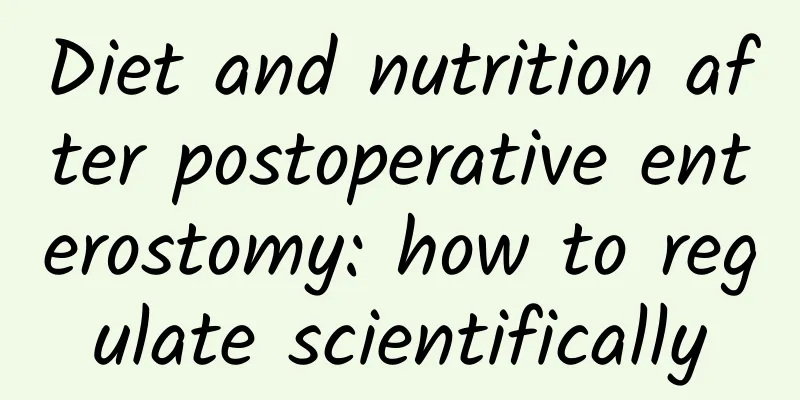Diet and nutrition after postoperative enterostomy: how to regulate scientifically

|
Diet and nutrition management for patients with postoperative enterostomy is a complex and important task. Through scientific dietary adjustment and nutritional intervention, the quality of life can be improved and intestinal health can be promoted. Dietary adjustment principles, the role of essential amino acids and dietary fiber, and individualized dietary strategies are essential for the recovery of patients with postoperative enterostomy. A comprehensive grasp of this knowledge can provide patients with the most appropriate diet and nutrition plan to help the intestine repair and maintain health. Nutrition is crucial to the recovery and quality of life of patients with postoperative enterostomy. Popularizing this knowledge can help medical staff provide more effective treatment plans and allow patients and their families to obtain correct diet and nutrition guidance. Through the further development of modern science and technology and nutritional science, it is believed that better diet and nutrition management can be provided to help patients regain health and vitality and enjoy a high quality of life. 1. Challenges faced by patients with postoperative enterostomy Postoperative enterostomy patients face multiple challenges, covering many areas of physiology, psychology and quality of life. Among them, weight loss, severe nutrient deficiency, nausea and vomiting, diarrhea and abdominal discomfort often occur, seriously affecting the daily life of patients. The impact of enterostomy surgery on the digestive system and nutrient absorption is easy to be ignored. Changes in intestinal function can cause exhaustion and further lead to metabolic disorders in patients. Postoperative enterostomy patients have difficulty in obtaining essential nutrients and maintaining a fixed weight. They need a lot of nutrition to maintain basic living needs. In addition, malnutrition will lead to a decline in the function of the immune system, making patients susceptible to infection and increasing the potential risk of complications. Psychologically, patients may experience anxiety, depression and other emotions. This situation is even more due to the huge changes in patients' digestion, nutrient intake and defecation methods, which brings troubles to their social life. These are all challenges that postoperative enterostomy patients must face and overcome on the road to a normal life. 2. Principles and methods of scientific dietary adjustment The dietary conditioning of patients with postoperative enterostomy varies from person to person, but there are some basic principles and methods worth following. The first principle is to maintain a balanced diet, which mainly means that the intake of energy, protein, fat and carbohydrates should be appropriate, not too much or too little. A suitable diet plan can be formulated based on the patient's weight, age, gender and activity level. It is to maintain the balance of the intestine. The intestine is an important organ of the human body, and its health will directly affect the body's nutritional intake. Patients with postoperative enterostomy need to ensure the normal functioning of the intestine and avoid problems such as food adhesion and food accumulation. Appropriate extracellular fluid, electrolyte balance and pH value are crucial for this. When it comes to scientific diet adjustment methods, the first recommendation is to eat small and frequent meals. The digestive function of patients with postoperative enterostomy may be affected to a certain extent. Eating small and frequent meals can reduce the burden on the gastrointestinal tract. You can try to add some fiber-rich foods, such as fruits and vegetables, which can help increase satiety and help the normal functioning of the intestines. By adopting these principles and methods, patients with postoperative enterostomy can not only adjust their diet in a scientific way, but also obtain good nutritional status and quality of life during the postoperative recovery period. 3. Contribution of high-protein and essential amino acid foods to intestinal repair Postoperative enterostomy patients need a lot of nutrients for intestinal recovery, among which high-protein and essential amino acid foods are particularly important. Protein is the basic substance for maintaining human life activities, and the intestine is the main part of the body that absorbs protein. Postoperative enterostomy patients need to pay attention to protein intake in their diet. First and foremost, high-protein foods can promote cell regeneration and help repair the postoperative intestinal fistula site. After the protein provided in the food is absorbed by the intestines, it is converted into amino acids and enters the blood, which are supplied to various parts of the body. These amino acids are used for the regeneration and repair of muscle cells, visceral cells, and intestinal cells. Among all kinds of amino acids, creatine, arginine and lysine are known as essential amino acids for intestinal health. These amino acids can enhance the intestinal absorption of nutrients, inhibit inflammatory response and enhance resistance. Furthermore, high-protein foods can promote the body's immune function. Patients with postoperative intestinal fistulas are often prone to infection, and protein is an important component of the immune system, which can improve the patient's immunity. Proper intake of high-protein and essential amino acid foods is an important way to help enterostomy patients restore intestinal health and prevent complications. 4. The importance of dietary fiber and water to intestinal health In the diet conditioning of patients with postoperative enterostomy, the intake of dietary fiber and water is a very seriously neglected link. Dietary fiber and water not only have an important impact on intestinal health, but also play a vital role in the recovery of patients with postoperative enterostomy. Dietary fiber is an element that many patients lack in their daily diet, but it helps maintain normal intestinal function and helps improve or prevent constipation. Dietary fiber not only increases the water content and volume of stool, making defecation smoother, but also helps maintain intestinal health by changing the composition of intestinal microflora. Patients with postoperative enterostomy should add foods rich in dietary fiber, such as fruits, vegetables, and whole grains, to their diet. Water is also an important factor in intestinal health. Sufficient water can keep the intestinal environment moist, prevent constipation, and help the intestine absorb nutrients. For patients with postoperative enterostomy, since the digestive function is affected to a certain extent, sufficient water can help the absorption and transportation of nutrients and prevent malnutrition. Meeting the intake of dietary fiber and water can help the recovery of the intestines and is also an important way for patients with postoperative enterostomy to improve their quality of life during the recovery period. 5. Outlook on individualized dietary adjustment and nutritional intervention strategies During the recovery period of postoperative enterostomy, individualized dietary adjustment and nutritional intervention strategies have opened up a new perspective. An individualized treatment plan should be formulated based on multiple factors such as the patient's age, gender, weight, physiological condition, surgical scope, and existing complications. The first thing is individualized energy supply. The diet should be carefully designed to meet the patient's needs for nutrients such as protein, fat and carbohydrates as much as possible to achieve the goal of postoperative repair and recovery. The degree of intestinal absorption of individual types of food must be taken into account, and appropriate food should be formulated to allow the intestinal recovery process to proceed smoothly. Nutritional intervention strategies are also an important part of dietary adjustment. Supplementing essential vitamins and inorganic salts helps the patient's body complete various necessary physiological reactions and can improve nutritional deficiencies caused by intestinal malabsorption. Dietary intervention to promote the balance of the intestinal microbiome is another important individualized strategy. After obtaining sufficient scientific evidence, the diet can be adjusted according to the patient's needs to nourish and maintain a healthy intestinal flora. These prospects will undoubtedly play an important role in improving the quality of life of postoperative patients, accelerating recovery and reducing the risk of complications. 6. The importance of scientific diet and nutrition in improving the quality of life of patients with postoperative enterostomy Scientific diet and nutrition are crucial to the quality of life of patients with postoperative enterostomy. Scientific diet provides balanced nutrients, enhances immunity, and promotes wound healing. Appropriate nutrition reduces the risk of disease. High-protein food repairs the intestines, essential amino acids maintain function, and dietary fiber and water promote normal excretion. Individualized dietary adjustment and nutritional intervention strategies improve patient recovery and quality of life. Conclusion Scientific diet and nutritional conditioning are crucial in the recovery journey of patients with postoperative enterostomy. High-protein and essential amino acid foods help intestinal repair, while dietary fiber and water keep the intestines healthy. Individualized dietary adjustment and nutritional intervention strategies are also key. We strive to find more methods that are conducive to recovery and improve the quality of life in the future. Scientific diet and nutritional conditioning run through the entire life process. I hope that every patient with postoperative enterostomy can regain health and start a new life. Author: Zhao Fang, Shanghai Ruijin Hospital Luwan Branch |
<<: Which diseases should be treated in thoracic surgery?
>>: Here are all the care methods you want to know about gout
Recommend
Don’t be in a hurry to “act” even if you are “heart-beating”. Patients with “heart failure” should pay attention to these aspects when traveling!
Recently, accompanied by his family, 70-year-old ...
There is a cure for those who always have trouble sleeping! Experts give 7 simple and effective dietary nutrition suggestions!
Sleep disorders are common physical functional di...
Antarctic krill oil, "IQ tax" or "treasure of the ocean"? The truth is...
Rumor: "Antarctic krill oil can improve brai...
What causes pelvic congestion? I was shocked after reading this
Nowadays, women are under great pressure in life....
shock! There are so many materials for rhinoplasty!
Everyone loves beauty. Some people whose facial f...
Maternal mortality rate
Most pregnant women will feel anxious and afraid ...
Is the Didi Rich Woman app real? Is there any platform where I can meet rich women?
Didi Rich Woman app is a recently launched softwa...
Early symptoms of liver disease in women
Women are weak, and they are even more vulnerable...
Abnormal bleeding may indicate cancer
Normal bleeding, except for menstruation, is gene...
Why can't pregnant women eat snow swallow?
There are many things that pregnant women should ...
What to do when your legs hurt during menstruation
Basically every woman has a few very annoying day...
Can I still get pregnant after having my period?
Nowadays, many girls have irregular menstruation....
What is levonorgestrel tablets?
When you are choosing levonorgestrel tablets, if ...
How to eat dried longan for best nutrition? How to tell if dried longan is moldy
Dried longan has a high iron content, which can i...
Does morning sickness usually occur in the morning or at night?
Female friends who are pregnant for the first tim...









